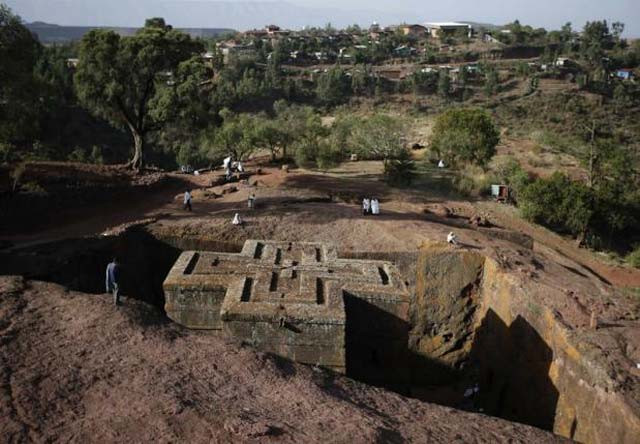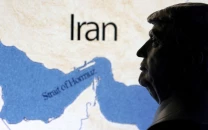Ethiopia declared best tourist destination
The African country ins known for its excellent preservation of humanity landmarks

A man stands above the Bet Medhane Alem rock church during an Orthodox Good Friday celebration in Lalibela, in this May 3, 2013 file photo. PHOTO: REUTERS
The body chose the African country for its excellent preservation of humanity landmarks such as the ruins of the city of Aksum which is considered as the heart of ancient Ethiopia and Fasil Ghebbi, which was used by the Etiopian emperors as their residence during the 16th and 17th century. The country is also known for the city Harar Jugol which has 82 mosques, 102 shrines, and unique interior design in the townhouses and Lalibela – a holy site for Christians encompassing eleven medieval stone carved churches from the 13th century.
 People pray around Saint George, one of the 11 famous monolithic rock-cut churches, during a Good Friday celebration in Lalibela in this May 3, 2013 file photo. PHOTO: REUTERS
People pray around Saint George, one of the 11 famous monolithic rock-cut churches, during a Good Friday celebration in Lalibela in this May 3, 2013 file photo. PHOTO: REUTERSThe list of historical landmarks in the country also include Konso Cultural Landscape (containing 55 kilometers of stonewalled terraces and fortified settlements), Lower Valley of the Awash, where humanity made its first steps and where was found the Eva of all mankind-Lucy fossil’s, Lower Valley of the Omo also containing fragments pertaining to early humanity development and the fossils of Homo Gracilis.
All of these sites are recognised and registered as UNESCO World heritage monuments.
 Tourism in Ethiopia is growing rapidly. PHOTO: REUTERS
Tourism in Ethiopia is growing rapidly. PHOTO: REUTERSTourism has also been identified as a primary tool for poverty eradication, for local community development and economic independence by the Ethiopian government under the plan of Poverty Reduction Strategy Paper (PRSP).
The Ethiopian embassy in United Kingdom, while acknowledging the award, tweeted pictures of some of the most popular sites in the country.
https://twitter.com/EthioEmbassyUK/status/618365223754403840/photo/1
Last year another African state Zimbabwe was declared as the top tourist spot.
Ethiopia has also seen a rush from European tourists after an Islamic State gunmen killed 27 people at a Tunsian resort on June 26.



















COMMENTS
Comments are moderated and generally will be posted if they are on-topic and not abusive.
For more information, please see our Comments FAQ